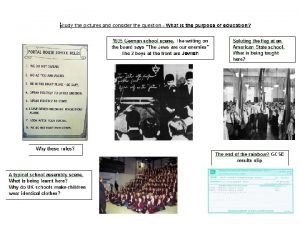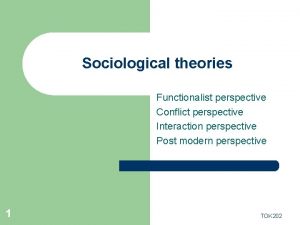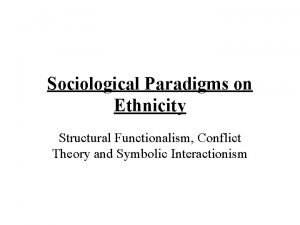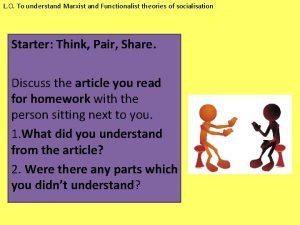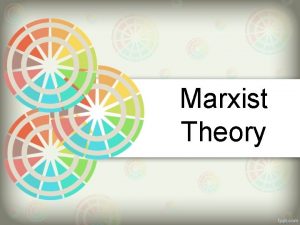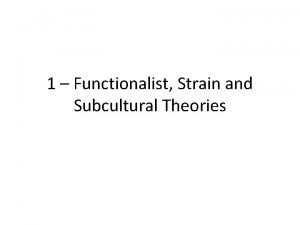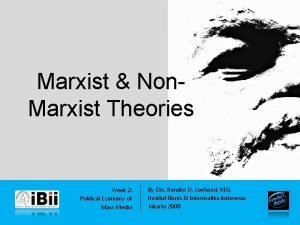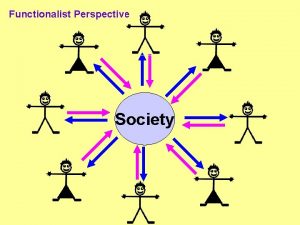L O To understand Marxist and Functionalist theories








- Slides: 8

L. O. To understand Marxist and Functionalist theories of socialisation Starter: Think, Pair, Share. Discuss the article you read for homework with the person sitting next to you. 1. What did you understand from the article? 2. Were there any parts which you didn’t understand?

Key words: functionalism, Marxism, Secondary socialisation, Primary Socialisation Grade D/C: Has a basic understanding of the different views held by Marxists and Functionalists on the purpose of socialisation. Limited use of key words Grade C/B: Can explain the Marxist and Functionalist theories of socialisation, linking these to agents of socialisation. Good use of key words Grade B/A: Can give a critical evaluation of the Marxist and Functionalist theories of socialisation. Able to link these to agents of socialisation and give examples. Excellent use of key words L. O. To understand Marxist and Functionalist theories of socialisation

Primary Socialisation Discuss: What do you think this means? Think back to the article you read for homework This is the earliest stage of socialisation. Most primary socialisation takes place within the family. It is very important in helping to shape human beings as it teaches us basic social skills. Primary socialisation occurs between individuals and the people who they have a close relationship with. L. O. To understand Marxist and Functionalist theories of socialisation

Secondary Socialisation Discuss: What do you think this means? Secondary socialisation starts when children become more independent. (this is usually when they start school). The function of secondary socialisation is to build on what has already been learned in primary socialisation so that children learn to understand take part in wider society (beyond their primary relationships). What are the main agents of secondary socialisation? ? L. O. To understand Marxist and Functionalist theories of socialisation

MARXISTS Vs FUNCTIONALISTS Task: In groups you will be looking at either the Marxist or the Functionalist view on socialisation. You will present this back to the other group and teach them about your theory. Include: -the beliefs of your theory -What evidence to they use to support their theory Extension: Can you include a criticism of your theory- why do some people disagree with that view?

Complete this table as you listen to the other group’s presentation. You will complete your own column for homework Functionalist Marxist Criticisms L. O. To understand Marxist and Functionalist theories of socialisation

Key words: functionalism, Marxism, Secondary socialisation, Primary Socialisation Grade D/C: Has a basic understanding of the different views held by Marxists and Functionalists on the purpose of socialisation. Limited use of key words Grade C/B: Can explain the Marxist and Functionalist theories of socialisation, linking these to agents of socialisation. Good use of key words Grade B/A: Can give a critical evaluation of the Marxist and Functionalist theories of socialisation. Able to link these to agents of socialisation and give examples. Excellent use of key words L. O. To understand Marxist and Functionalist theories of socialisation

Plenary: Pupil questioning- Ask someone in the class a question based on today’s lesson and learning outcome. Decide whether the person has answered the question correctly or give a target to help them improve. The next person will now ask a question. .
 To understand recursion you must understand recursion
To understand recursion you must understand recursion Role allocation davis and moore
Role allocation davis and moore Functionalist vs conflict theory
Functionalist vs conflict theory Define structural functionalism
Define structural functionalism Functionalist perspective on divorce
Functionalist perspective on divorce Functionalist view on youth subculture
Functionalist view on youth subculture Murdocks 4 functions
Murdocks 4 functions Functionalist view on education criticism
Functionalist view on education criticism Functionalist perspective on deviance
Functionalist perspective on deviance

